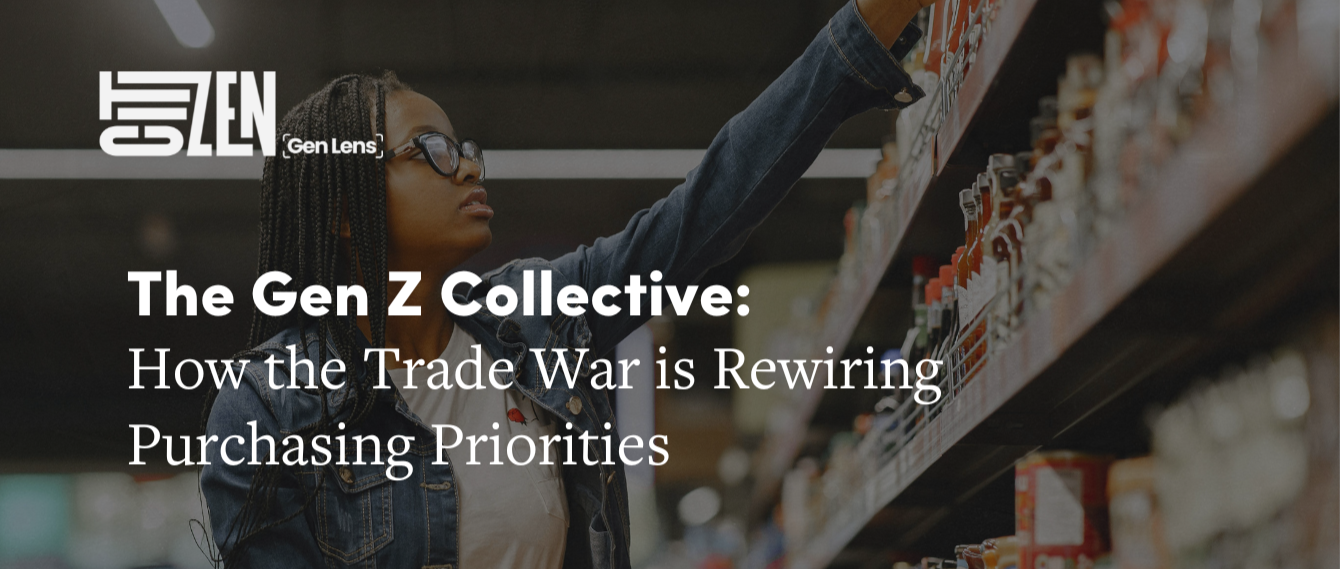The Gen Z Collective: How the Trade War is Rewiring Purchasing Priorities
April 23, 2025

Citizen’s introduces The Gen Z Collective, an ongoing series uncovering the nuanced motivations, evolving priorities, and untapped opportunities within this pivotal generation.
The economic shockwaves of the 2025 trade war are profoundly impacting Gen Z, a generation whose commitment to social responsibility now intersects with urgent financial realities. For brand leaders, understanding this shifting dynamic is no longer optional – it’s business critical. This article offers a deep dive into the specific ways the trade war is influencing Gen Z’s purchasing behavior, revealing essential insights and actionable strategies for brands seeking to maintain relevance and build loyalty in this evolving landscape.
The Impact of the 2025 Trade War on Gen Z
The 2025 trade war – marked by widespread tariffs, a fluctuating stock market and general economic uncertainty – introduces a new layer of complexity to Gen Z’s relationship with brands. Potential price increases due to tariffs will very well lead to a heightened focus on value-driven shopping. While sustainability remains a concern, Gen Z will likely curb their willingness to pay extra for eco-friendly products. A collective shared anxiety will delay purchase decisions, with short-term thinking taking precedence over long-term planning.
Key implications of the trade war for Gen Z’s choices:
- Conflict Between Ethics and Affordability: The economic pressures of the trade war are forcing Gen Z consumers to make difficult choices, prioritizing affordability over ethically sourced products if they come at a higher cost. In the USA, Gen Z consumers are preparing to shift their consumer habits, such as seeking thrifting options for apparel.
- Rise of Nationalistic Sentiments: In countries like Canada, the trade war has fueled “Buy Canadian” movements across the country. And while Gen Z finds buying Canadian important, they face considerable barriers. With a quarter of those aged 25-34 facing food insecurity already, Gen Z are most likely to prioritize affordability over locally sourced products, despite a desire to support the movement. In the US, it’s likely such a movement will gain fervor in the near future – albeit being driven by price versus patriotism.
- Leveraging Digital Platforms for Value and Information: The trade war is pushing Gen Z to delay their purchasing decisions, giving them more time to weigh the costs and benefits. And their first course of action is to spend more time inquiring about brands – their practices and their pricing – online. In fact, 46% of Gen Z’s won’t purchase from a brand if they don’t find independent information about it.
Appealing to Gen Z in the Context of the Trade War
To effectively engage with Gen Z during this period, businesses and marketers need to pivot from their typical ‘marketing in a recession’ playbook. They’re skeptical about branded content and messaging, especially on social media where three quarters of Gen Z agree that the presence of too many ads has ruined their experience. Combine that with their use of humor and “meme culture” to deal with most situations, breaking through the clutter to appeal to them isn’t an easy feat.
Brands, instead, need to shift their approach, speaking to Gen Z on their level – bluntly, with full transparency, and a bit of humor.
- Emphasize Value and Affordability: Gen Z wants to be heard, more than anything. Show them you understand where they’re coming from with empathy and clearly communicate the value proposition you’re offering without compromising on ethics. Explore opportunities to offer competitive pricing on socially responsible products.
- Show Authentic Commitment to Their Values: Back up your claims with tangible actions and be transparent about your sourcing, production, and social impact initiatives. Since affordability is on their minds, give them the “why” behind your pricing.
- Connect Transparently Online:Utilize social platforms to take them behind the scenes of the brand bringing them into your world and engaging in open dialogue. This level of trust and authenticity is what they are craving.
- Partner with Authentic Influencers: Influencer marketing is even more crucial today than it was before but who you partner with is the real key. Gen Z wants to hear from real people they can relate to, not big brand spokespeople. Partnering with micro and nano influencers that have a platform built on trust with their audience will prove to be more effective than partnering with household names.
- Foster Community Building: Create opportunities for Gen Z consumers to connect with each other and your brand around shared social and ethical concerns. With their increased desire for IRL spaces and to find community, find ways to bring Gen Z consumers into your space to build a connection with them.
- Be Transparent About Potential Price Increases: If tariffs lead to price changes, communicate these changes openly and explain the reasons behind them. Highlight any efforts being made to mitigate the impact on consumers. It’s early to tell the long term impact, but some campaigns highlighting local artisans have reached great affinity in the early stages.
At this stage, the 2025 trade war has brought in economic complexities that are impacting Gen Z’s wallet. The changes in their decision-making behavior are out of necessity. There is an expectation that they will return to value-driven decisions once the economy starts to stabilize – but it’s anybody’s guess when that will happen. Staying informed on Gen Z’s evolving values and concerns, especially as it pertains to the trade war, is a way to stay on top of the trends and keep strategies appropriately updated. It’s worth continuing to prioritize authenticity, transparency, and a genuine commitment to social and environmental responsibility to continue to build brand loyalty. However, companies must be mindful of economic realities and nationalistic sentiments and balance their approach to effectively connect with Gen Z in this evolving landscape.
